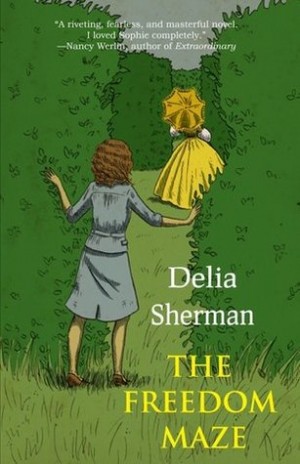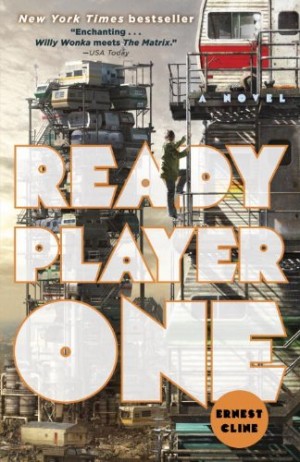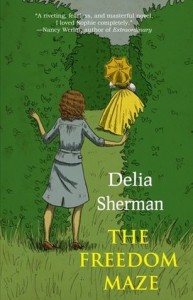
The Libertarian Futurist Society issued a press release on Friday, July 13th, announcing the winners (plural) of the 2012 Prometheus Award for Best Libertarian Novel.
The winners and finalists, with links to our reviews:
The Winners
- Ready Player One by Ernest Cline
- The Freedom Maze by Delia Sherman (consistently came in last in voting for our Lightmonthly Read selection; not yet reviewed)
The Finalists
- The Children of the Sky by Vernor Vinge
- In the Shadow of Ares by Thomas L. James and Carl C. Carlsson
- The Restoration Game by Ken MacLeod
- Snuff by Terry Pratchett (our current Lightmonthly Read; review coming in early August)
The 2012 Prometheus Hall of Fame Award winner is “The Machine Stops” by E.M. Forster.
Our Take
We’re not sure we would have recommended any of the finalists for the Prometheus Award this year.
We haven’t read The Freedom Maze yet, so we can’t question its selection as a co-winner. Maybe it is worthy and we’ll discover this if and when we get around to reading it. Clearly it meets the criteria of the LFS voting membership.
While we enjoyed Ready Player One we do not think it was libertarian enough to qualify for the Prometheus Award. The same goes for The Children of the Sky and The Restoration Game.
While In the Shadow of Ares was libertarian enough, and apparently written by actual libertarians (unlike many Prometheus Award winners), and we enjoyed it, we do think the writing quality was not quite there. The authors are ones to keep an eye on, however.
We’re currently reading Snuff and, as one would expect from Terry Pratchett, it is well written. Whether we think it is unambiguously libertarian enough remains to be seen. We’ll publish a review in early August.
We’d love to publish a review of Delia Sherman’s The Freedom Maze, if anyone is interested in submitting one.
~*~
Read the full press release below.
FOR IMMEDIATE RELEASE, July 13, 2012
2012 PROMETHEUS BEST NOVEL WINNERS ANNOUNCED
The Libertarian Futurist Society will hold its annual awards ceremony for the Prometheus Award during Chicon, the 70th World Science Fiction Convention, to be held August 30-September 3 at the Hyatt Regency Chicago.
For the second time in its history, there’s a tie for the Best Novel award. The two winners are The Freedom Maze (Small Beer Press) by Delia Sherman and Ready Player One (Random House) by Ernest Cline. The award for Best Classic Fiction (the “Hall of Fame” award) goes to The Machine Stops, a short story by E. M. Forster, written in 1909.
At its award ceremony to be held at the WorldCon in Chicago, the Libertarian Futurist Society will present plaques and one-ounce gold coins to Delia Sherman and Ernest Cline. A smaller gold coin and a plaque will be presented to The Machine Stops. The specific time and location will be available in the convention program.
This was the first Prometheus nomination for both Sherman and Cline. Sherman’s credits include five fantasy novels anediting two collections. Ready Player One is Cline’s first novel; his official bio includes a variety of odd jobs, poetry slams and writing screenplays.
Delia Sherman’s young-adult fantasy novel focuses on an adolescent girl of 1960 who is magically sent back in time to 1860 when her family owned slaves on a Louisiana plantation. She’s mistaken for a light-skinned slave fathered by a plantation owner. She endures great hardships, commiserates with others suffering worse, works in the household and the fields, and sees the other slaves demonstrating their humanity in the face of incredible adversity. In the process, she comes to appreciate the values of honor, respect, courage, and personal responsibility.

Ernest Cline’s genre-busting blend of science fiction, romance, suspense, and adventure describes a virtual world that has managed to evolve an order without a state in which entrepreneurial gamers must solve virtual puzzles and battle real-life enemies to save their virtual world from domination and corruption. The main characters work together without meeting in the real world until near the end of the story. The novel stresses the importance of allowing open access to the Internet for everyone.
The Machine Stops by E.M. Forster was published in 1909. Forster described it as a reaction to H.G. Wells’s fiction. The story describes a future in which most people never leave their rooms and interact only through the Machine’s video and text facilities. People in this dystopia depend on the Machine for all their needs. When the Machine falls into disrepair and fails, the people are isolated from one another and many die, though Forster depicts it as a hopeful ending with a few wild humans on the surface likely to carry on and learn to be self-sufficient again.
The other finalists for the Best Novel award were The Children of the Sky (TOR Books) by Vernor Vinge, In the Shadow of Ares (Amazon Kindle edition) by Thomas L. James and Carl C. Carlsson, The Restoration Game (Pyr Books) Ken MacLeod, and Snuff (Harper Collins) by Terry Pratchett. MacLeod has won three Best Novel awards, Vinge has won twice, and Pratchett has one previous winner.
The other finalists for the Hall of Fame award were As Easy as A.B.C., a story by Rudyard Kipling (1912); ‘Repent, Harlequin!’ Said the Ticktockman, a story by Harlan Ellison (1965); and Falling Free, a novel by Lois McMaster Bujold (1988).
The LFS is announcing the winning works before the ceremony so that fans of the works and the writers can begin to make plans for attending the awards ceremonies. Anyone interested in more information about the awards ceremony or other LFS activities at ChiCon can send email to programming@lfs.org.
The Prometheus awards for Best Novel, Best Classic Fiction (Hall of Fame), and (occasional) Special Awards honor outstanding science fiction and fantasy that explores the possibilities of a free future, champions human rights (including personal and economic liberty), dramatizes the perennial conflict between individuals and coercive governments, or critiques the tragic consequences of abuse of power–especially by the State.
The Prometheus Award, sponsored by the Libertarian Futurist Society (lfs.org), was established in 1979, making it one of the most enduring awards after the Nebula and Hugo awards, and one of the oldest fan-based awards currently in sf. Presented annually since 1982 at the World Science Fiction Convention, the Prometheus Awards include a gold coin and plaque for each of the winners.
Publishers who wish to submit novels published in 2011 for the 2012 Best Novel award should contact Michael Grossberg, Chair of the LFS Prometheus Awards Best Novel Finalist judging committee online at BestNovelChair@lfs.org domain or via postal mail at 3164 Plymouth Place, Columbus OH 43213.
The Hall of Fame, established in 1983, focuses on older classic fiction, including novels, novellas, short stories, poems and plays. Past Hall of Fame award winners range from Robert Heinlein and Ayn Rand to Ray Bradbury and Ursula LeGuin.
Founded in 1982, the Libertarian Futurist Society sponsors the annual Prometheus Award and Prometheus Hall of Fame; publishes reviews, news and columns in the quarterly “Prometheus”; arranges annual awards ceremonies at the WorldCon; debates libertarian futurist issues (such as private space exploration); and provides fun and fellowship for libertarian SF fans. All members of the LFS are eligible to nominate eligible works for its awards, and to vote on the Hall of Fame. Full members are eligible to vote on the Best Novel.
A list of past winners of LFS awards can be found on the LFS web site at www.lfs.org
For more information, contact LFS Publicity Chair Chris Hibbert (publicity@lfs.org).
















Comments on this entry are closed.
Matthew Alexander July 16, 2012 @ 11:27 pm | Link
I have read In the Shadow of Ares, Ready Player One, The Restoration Game and am reading Snuff. So far, I would say that Snuff is the best piece of work, but not (yet) libertarian for my tastes. Ares is the only one that qualifies as libertarian for my money, although Snuff is lurking around the edges.
Hard to say how I would have voted. Do you vote for the best book? Snuff is shaping up to be the best of the four I have read. Or do you limit your choices only to books that are libertarian? In that case, Ares stands without competition.
Geoffrey Allan Plauché July 17, 2012 @ 12:16 am | Link
There doesn’t have to be a winner. In 1985 no winner was chosen because the top vote getting option was “none of the above.” In other words, all of the finalists were deemed unworthy of the award on one ground or another. Perhaps that should be the result more often and the award is given away too freely. In my opinion, a book worthy of the award should be both unambiguously libertarian and well-written.
Matthew Alexander July 17, 2012 @ 8:06 pm | Link
I agree with you. Ares is unambiguously libertarian; the question is whether or not it was high enough in quality. It certainly did have its moments.
The Prometheus Award seems to follow that train of thought in some libertarians who try to trick people into believing they are libertarian by lowering standards, playing with word choice and that sort of thing. I wonder if the idea here is to get Pratchett and MacLeod into the tent by nominating them for libertarian awards. I don’t see it working, if that is indeed the design.